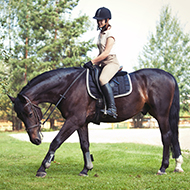New documentary released on pain in ridden horses

The Ridden Horse Pain Ethogram (RHpE) is a catalogue of 24 behaviours associated with pain in the ridden horse.
A new documentary on the signs of pain in the ridden horse has been released online, featuring the research of Dr Sue Dyson.
Published on YouTube, the 35-minute film has been created by animal-based videographer Padma Video and the US-based Train with Trust Project.
'The 24 Behaviour os the Ridden Horse in Pain' explains The Ridden Horse Pain Ethogram (RHpE) – a tool developed over a three-year study to predict lameness before the condition worsens, or before other signs of injury.
Dr Dyson and Dr Jim Myers feature in the documentary, which follows the duo as they examine and diagnose show jumper Lauren McMahon's horse Galina. Though not obviously lame, Galina was becoming more resistant under saddle.
Explaining the need for the documentary, Dr Dyson said: “We are conditioned that many horse behaviours are normal, when they are not.
“We need to appreciate that what we call ‘naughty horses’ are often a reflection of underlying musculoskeletal pain.”
Dr Laurie Goodrich, director of the Orthopedic Research Center at Colorado State University’s C. Wayne McIlwraith Translational Medicine Institute, commented: “Careful and quality research performed by one of the most experienced and world-renowned clinicians and her team is getting at the heart of what horses have been trying to tell us for centuries!”
Olympic Silver medalist Mary King MBE added: Performance problems are so often blamed on the horse or rider, without consideration of the possibility of underlying discomfort.
“The horse's behaviour may be telling us that even in the absence of overt lameness something may be wrong.
“Early recognition of this, appropriate investigation and treatment may improve the horse's performance, welfare and enhance rideability.”



 The latest
The latest